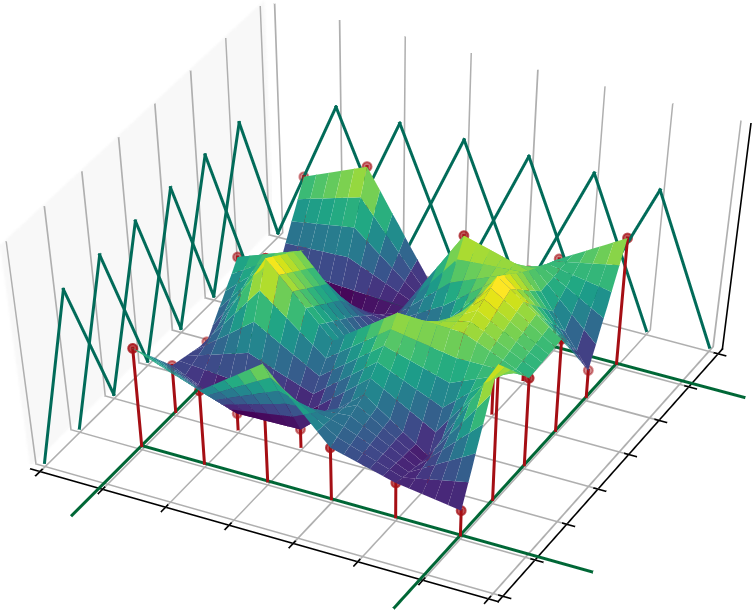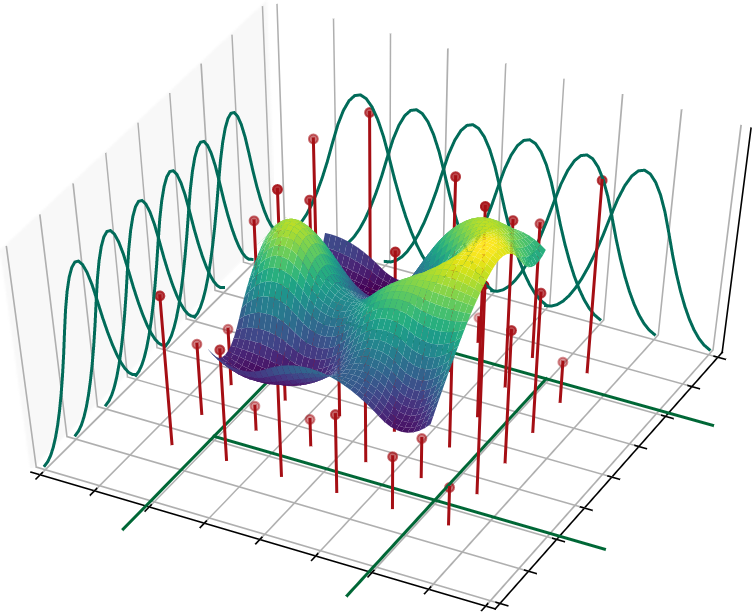Implementation of the Spline-Based Convolution Operator of SplineCNN in PyTorch
Project description
Spline-Based Convolution Operator of SplineCNN
This is a PyTorch implementation of the spline-based convolution operator of SplineCNN, as described in our paper:
Matthias Fey, Jan Eric Lenssen, Frank Weichert, Heinrich Müller: SplineCNN: Fast Geometric Deep Learning with Continuous B-Spline Kernels (CVPR 2018)
The operator works on all floating point data types and is implemented both for CPU and GPU.
Installation
Anaconda
Update: You can now install pytorch-spline-conv via Anaconda for all major OS/PyTorch/CUDA combinations 🤗
Given that you have pytorch >= 1.8.0 installed, simply run
conda install pytorch-spline-conv -c pyg
Binaries
We alternatively provide pip wheels for all major OS/PyTorch/CUDA combinations, see here.
PyTorch 2.0
To install the binaries for PyTorch 2.0.0, simply run
pip install torch-spline-conv -f https://data.pyg.org/whl/torch-2.0.0+${CUDA}.html
where ${CUDA} should be replaced by either cpu, cu117, or cu118 depending on your PyTorch installation.
cpu |
cu117 |
cu118 |
|
|---|---|---|---|
| Linux | ✅ | ✅ | ✅ |
| Windows | ✅ | ✅ | ✅ |
| macOS | ✅ |
PyTorch 1.13
To install the binaries for PyTorch 1.13.0, simply run
pip install torch-spline-conv -f https://data.pyg.org/whl/torch-1.13.0+${CUDA}.html
where ${CUDA} should be replaced by either cpu, cu116, or cu117 depending on your PyTorch installation.
cpu |
cu116 |
cu117 |
|
|---|---|---|---|
| Linux | ✅ | ✅ | ✅ |
| Windows | ✅ | ✅ | ✅ |
| macOS | ✅ |
Note: Binaries of older versions are also provided for PyTorch 1.4.0, PyTorch 1.5.0, PyTorch 1.6.0, PyTorch 1.7.0/1.7.1, PyTorch 1.8.0/1.8.1, PyTorch 1.9.0, PyTorch 1.10.0/1.10.1/1.10.2, PyTorch 1.11.0 and PyTorch 1.12.0/1.12.1 (following the same procedure).
For older versions, you need to explicitly specify the latest supported version number or install via pip install --no-index in order to prevent a manual installation from source.
You can look up the latest supported version number here.
From source
Ensure that at least PyTorch 1.4.0 is installed and verify that cuda/bin and cuda/include are in your $PATH and $CPATH respectively, e.g.:
$ python -c "import torch; print(torch.__version__)"
>>> 1.4.0
$ echo $PATH
>>> /usr/local/cuda/bin:...
$ echo $CPATH
>>> /usr/local/cuda/include:...
Then run:
pip install torch-spline-conv
When running in a docker container without NVIDIA driver, PyTorch needs to evaluate the compute capabilities and may fail.
In this case, ensure that the compute capabilities are set via TORCH_CUDA_ARCH_LIST, e.g.:
export TORCH_CUDA_ARCH_LIST = "6.0 6.1 7.2+PTX 7.5+PTX"
Usage
from torch_spline_conv import spline_conv
out = spline_conv(x,
edge_index,
pseudo,
weight,
kernel_size,
is_open_spline,
degree=1,
norm=True,
root_weight=None,
bias=None)
Applies the spline-based convolution operator



Parameters
- x (Tensor) - Input node features of shape
(number_of_nodes x in_channels). - edge_index (LongTensor) - Graph edges, given by source and target indices, of shape
(2 x number_of_edges). - pseudo (Tensor) - Edge attributes, ie. pseudo coordinates, of shape
(number_of_edges x number_of_edge_attributes)in the fixed interval [0, 1]. - weight (Tensor) - Trainable weight parameters of shape
(kernel_size x in_channels x out_channels). - kernel_size (LongTensor) - Number of trainable weight parameters in each edge dimension.
- is_open_spline (ByteTensor) - Whether to use open or closed B-spline bases for each dimension.
- degree (int, optional) - B-spline basis degree. (default:
1) - norm (bool, optional): Whether to normalize output by node degree. (default:
True) - root_weight (Tensor, optional) - Additional shared trainable parameters for each feature of the root node of shape
(in_channels x out_channels). (default:None) - bias (Tensor, optional) - Optional bias of shape
(out_channels). (default:None)
Returns
- out (Tensor) - Out node features of shape
(number_of_nodes x out_channels).
Example
import torch
from torch_spline_conv import spline_conv
x = torch.rand((4, 2), dtype=torch.float) # 4 nodes with 2 features each
edge_index = torch.tensor([[0, 1, 1, 2, 2, 3], [1, 0, 2, 1, 3, 2]]) # 6 edges
pseudo = torch.rand((6, 2), dtype=torch.float) # two-dimensional edge attributes
weight = torch.rand((25, 2, 4), dtype=torch.float) # 25 parameters for in_channels x out_channels
kernel_size = torch.tensor([5, 5]) # 5 parameters in each edge dimension
is_open_spline = torch.tensor([1, 1], dtype=torch.uint8) # only use open B-splines
degree = 1 # B-spline degree of 1
norm = True # Normalize output by node degree.
root_weight = torch.rand((2, 4), dtype=torch.float) # separately weight root nodes
bias = None # do not apply an additional bias
out = spline_conv(x, edge_index, pseudo, weight, kernel_size,
is_open_spline, degree, norm, root_weight, bias)
print(out.size())
torch.Size([4, 4]) # 4 nodes with 4 features each
Cite
Please cite our paper if you use this code in your own work:
@inproceedings{Fey/etal/2018,
title={{SplineCNN}: Fast Geometric Deep Learning with Continuous {B}-Spline Kernels},
author={Fey, Matthias and Lenssen, Jan Eric and Weichert, Frank and M{\"u}ller, Heinrich},
booktitle={IEEE Conference on Computer Vision and Pattern Recognition (CVPR)},
year={2018},
}
Running tests
pytest
C++ API
torch-spline-conv also offers a C++ API that contains C++ equivalent of python models.
mkdir build
cd build
# Add -DWITH_CUDA=on support for the CUDA if needed
cmake ..
make
make install














